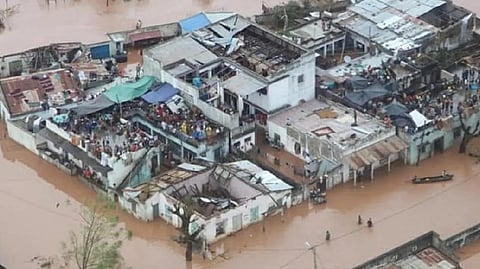

UNITED NATIONS: The UN and its humanitarian partners are bracing for a second landfall of the long-running tropical cyclone Freddy on Mozambique, a top official said.
"The UN is providing food, tents, kitchen sets, water purification and health supplies, and we are preparing for the second landfall," said Stephane Dujarric, the chief spokesman for UN Secretary-General Antonio Guterres.
The world body and its partners continue to support government-led relief efforts in Mozambique and on the isle of Madagascar.
Dujarric said more than 81,000 people in Madagascar received humanitarian assistance, including food, water, sanitation, and hygiene services.
In addition, given the humanitarian needs, Martin Griffiths, the UN's Emergency Relief Coordinator, allocated $8.5 million from the Central Emergency Response Fund.
The UN Office for the Coordination of Humanitarian Affairs (OCHA), headed by Griffiths, said in its latest situation report 10 people died in Madagascar due to the latest rains, bringing Freddy's death toll to at least 27 people, 10 in Mozambique and 17 in Madagascar.
The storm took a second swipe at Madagascar earlier this week and is expected to make landfall -- its second -- in Mozambique early Saturday.
OCHA said the government and humanitarians in Malawi are preparing for the possibility of Freddy's heavy rains.
The World Meteorological Organization (WMO) said Freddy first hit Madagascar on February 21, striking Mozambique three days later.
The WMO said it established a panel of experts to determine if the 33-day-old tempest is setting any records.
"It has been a named tropical cyclone for 33 days, crossed the entire South Indian Ocean and travelled more than 8,000 km," the WMO said on its website.
"The accumulated cyclone energy (index used to measure the energy) is the equivalent of an average full North Atlantic hurricane season."
The WMO said Freddy spent several days bringing heavy rains and flooding to Mozambique and Zimbabwe.
It then looped back to the Mozambique Channel, picked up energy from the warm waters, and moved toward the southwestern coast of Madagascar and then back toward Mozambique.
Visit news.dtnext.in to explore our interactive epaper!
Download the DT Next app for more exciting features!
Click here for iOS
Click here for Android